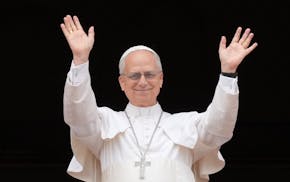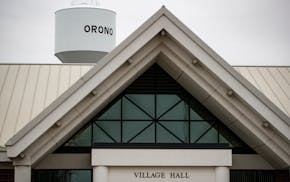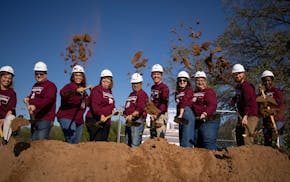It took four years of continuous lobbying to get officials with the Twin Cities Marathon to allow five people to run the 10-mile and marathon courses with hand bikes, including those using e-assist. But an ecstatic Quinn Brett, a Minnesota native and advocate for people with disabilities, was gushing.
"This is huge!" she said.
Marathons across the country have long had a wheelchair category allowing elite athletes to race using expensive equipment. And, in recent years, Brett said, about 30 have added a category allowing hand-cycle users to race.
But this Sunday's Twin Cities Marathon is the first to allow battery-assisted devices, including Brett's e-hand cycle, that enable people who cannot or don't want to compete to still participate. The result is that a course that Brett ran several times before she became disabled is now open for her to just enjoy.
"The WIN with TCM is that NO other races in the country are doing this yet!!!! Pretty cool door open to inclusion," Brett wrote in an email.
Marathon officials characterized the move as a pilot they hope to use to learn more about how e-devices interact with runners on a crowded racecourse. It will help them learn how to safely integrate a wider range of people with disabilities, officials said, leading to even greater inclusivity. This year includes 41 people with disabilities, a record, said Dean Orton, president of Twin Cities in Motion, which runs the events.
In addition to the hand-cycle pilot, the marathon's Athletes with Disabilities Program includes Duo Teams, in which one rider and three pushers allow a participant without the ability to power the chair to be a part of the event; Guide Runners for the Visually Impaired, where teams of two runners — one visually impaired and one a sighted guide — run the course together; and the Professional Push-Rim Wheelchair Racing Division, where invited athletes with disabilities compete for awards and prize money.
"Our larger goal is to get people in motion," Orton said. "You try to keep removing barriers and create opportunities."
Brett, who grew up in New Hope and attended the University of Minnesota, ran the Twin Cities Marathon "two or three times" while in college.
"Then I moved to the mountains, and I found running from the rim to the rim of the Grand Canyon," the current Colorado resident said in an interview.
Then she became a competitive rock-climber. In 2017 while climbing El Capitan in Yosemite National Park, Brett fell and was paralyzed from the waist down.
Her world "flipped," she said.
"Going from doing handstands on top of never-been-climbed mountain summits, to not getting into bathrooms in a city because the doorway isn't wide enough or told I am 'not allowed' because of my wheelchair" was frustrating and discouraging, she said.
She began advocating for change. After working for the National Park Service, Brett started a consulting company on adaptive recreation. She also works with the Minnesota-based nonprofit Unite 2 Fight Paralysis — one of more than 50 charities working with the Twin Cities Marathon.
Unite 2 Fight seeks to get more people with mobility disabilities to "run" any of the races, Brett said. She's hopeful that allowing people who need assistive devices to also enjoy what organizers call "the most beautiful urban marathon in America" will lead other races to be more inclusive as well.
In her email, Brett said "marathons across the world are STILL denying people with disabilities from entering any running race with the battery-powered mobility device out of fear of us going too fast, running over everyone's toes ... whatever it is."
She and marathon officials said they hope to learn that many of those fears can be mitigated and that more people will find the marathon and 10-mile courses open for them. Brett's e-hand bike is ready to roll.
"I'll be there Sunday," Brett said for her 7:55 a.m. start. "I can't wait."
.
Body of canoer found in Boundary Waters

Pope Leo XIV calls for peace in Ukraine and Gaza in symbolically rich blessing on Mother's Day

Orono voters head to polls Tuesday for special City Council election
New program at U of M facilitates veterans' path from combat medics to doctors

